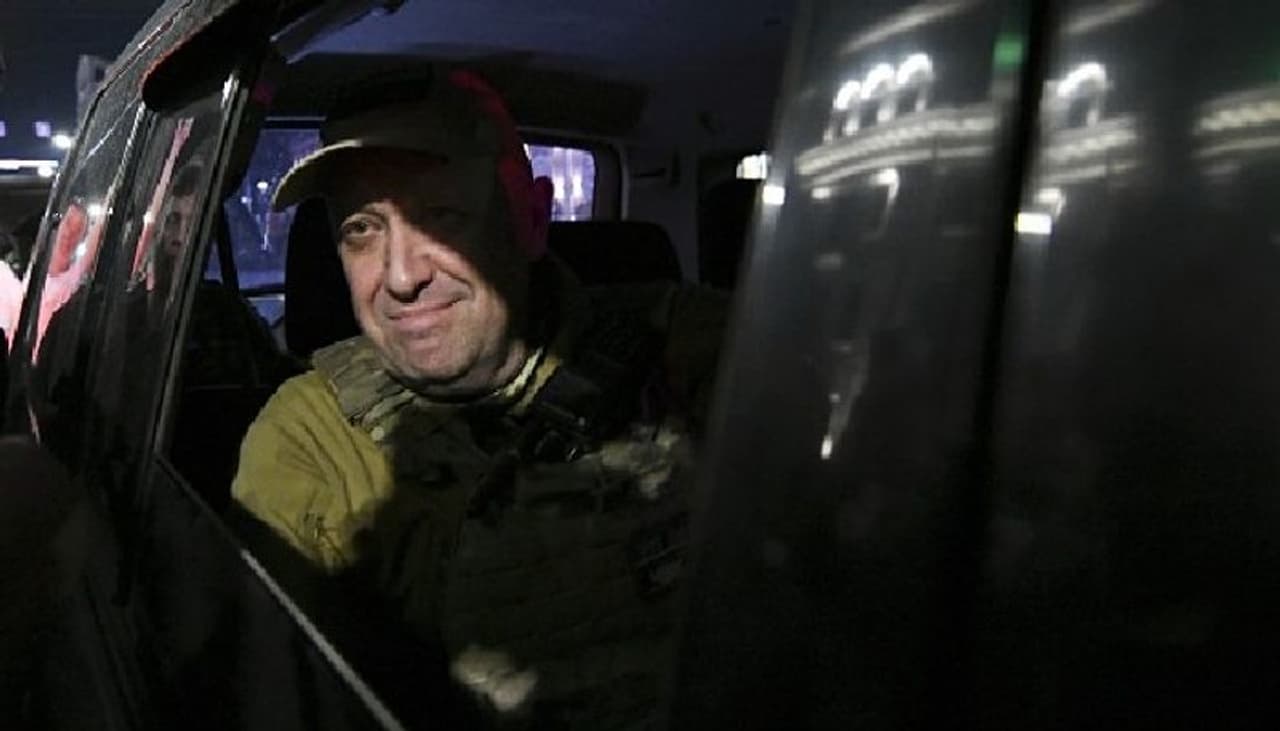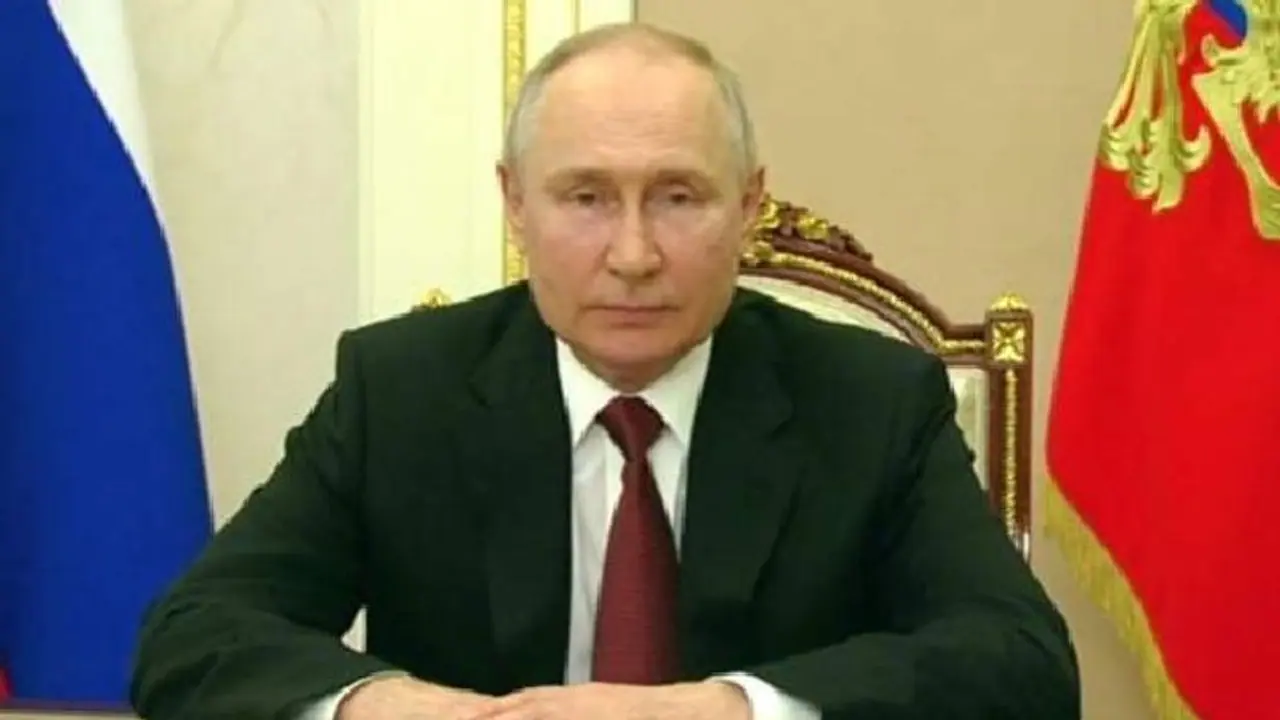On Monday, Russian President Vladimir Putin appeared in a video where he addressed an engineering forum, two days after the aborted Wagner mutiny. However, the original date of the video and where it was recorded remains unknown.
Two days after Wagner mercenary group, led by Yevgeny Prigozhin, aborted its mutiny to avoid Russian bloodshed, President Vladimir Putin appeared in a video where he addressed an engineering forum on Monday. During his address, Putin did not mention the aborted Wagner revolt, leaving people to wonder about the Russian president's whereabouts. Interestingly, the engineering forum's official website does not list Putin as being among the guests or speakers.

A tantalising but potentially even riskier future without Russian President Vladimir Putin has was recently teased to the globe. As a result, the stakes for the West in the Ukraine War greatly increased. Yevgeny Prigozhin, the leader of a mercenary group, openly mocked the Kremlin over the course of a mutinous weekend, calling to mind Russia's bloody history of revolutions and coups. Ultimately, a civil war that seemed about to burst out was averted – at least for now.
Putin's furious national TV address on Saturday morning, in which he accused Wagner head Yevgeny Prigozhin of a "stab in the back" and treason, seemed to mirror his well-known dislike of betrayal.
But, where is Putin now that the Wagner group has withdrawn its rebellion?
Putin spokesperson Dmitry Peskov was quoted by the Russian state news outlet TASS as claiming that his boss was "working in the Kremlin" on Saturday during the crisis' peak. However, other users on Twitter pointed out that Putin's presidential aircraft, bearing the identifier Il96-300PU, departed Moscow at 2:16 p.m. local time, using information from the FlightRadar plane tracking service.
Putin's plane, which was headed for St. Petersburg when it disappeared near Tver, according to the BBC. The Russian president hasn't been spotted in public since he made the speech threatening to punish Prigozhin severely, according to Bloomberg.
Putin has plenty of locations to visit. He reportedly has a number of mansions, including a home on the Black Sea, according to USA Today.

The Russian leader also had a phone call with the Iranian president on Monday, according to the Kremlin, so Putin and his government are projecting an impression they're getting on with business as usual.
Meanwhile, Russia's Prime Minister Mikhail Mishustin called on his cabinet to unite behind Putin. "The main thing in these conditions is to ensure the sovereignty and independence of our country, the security and well-being of citizens," said Mishustin, a technocrat who was appointed prime minister in 2020.
"For this, the consolidation of the whole of society is especially important; we need to act together, as one team, and maintain the unity of all forces, rallying around the president," he said.
What will Putin do next?
While the accord put an end to a severe crisis, analysts claimed Wagner's uprising had shown how flimsier than previously believed Putin's hold on power was. Even the experts are unsure of what will occur next.
Some believe Putin will retaliate in some fashion, possibly by using force against Ukraine or those within Russia who have been unsupportive. According to Polish MEP Radek Sikorski, the Russian leader would "probably purge those who he saw as wavering," which would increase his regime's authoritarianism and brutality.
The Kremlin strongman appeared to flinch at a military clash with the members of Prigozhin's Wagner Group in an effort to keep control of the situation. But Prigozhin's defiance—along with Putin's retreat after accusing him of treason but subsequently consenting to a compromise that would appear to allow him to flee to exile in Belarus—punched the deepest holes in the Russian president's authority in a generation in office. No longer in question, Putin's political survival is imperilled by the war he started to obliterate Ukraine. The ramifications now need to be addressed by the rest of the globe.
As US secretary of state Antony Blinken told CBS’s Face the Nation on Sunday, the rebellion was a ‘direct challenge’ to Putin that ‘raises ‘profound questions’. “We can’t speculate or know exactly where that’s going to go. We do know that Putin has a lot more to answer for in the weeks and months ahead.”
Kirill Rogov, a former Russian government advisor, told Bloomberg, “Putin had to make concessions and actually surrender, and instead of defeating Prigozhin, he had to negotiate with him and give security guarantees, demonstrating in public his vulnerability.”
“Previously, Putin absolutely didn’t allow anyone to talk to him in the language of public ultimatums,” added Rogov, who heads Vienna-based think-tank Re:Russia.
Leading Russia analyst Tatiana Stanovaya wrote on Telegram, “Many inside the elite will personally blame Putin for the fact that everything went so far and that there was no proper reaction from the president in good time. Therefore, this whole story is also a blow to Putin’s positions.”
According to a CNN report, Putin may act irrationally in a bid to project strength.
“He may prove unable to accept the logic of defeat in the coming months on the frontlines in Ukraine. He may be unaware of the depth of discontent among his own armed forces, and lack proper control over their actions. Russia’s position as a responsible nuclear power rests on stability at the top,” the piece said.
“A lot more can go wrong than it can go right. But it is impossible to imagine Putin’s regime will ever go back to its previous heights of control from this moment. And it is inevitable that further turmoil and change is ahead,” the piece concluded.
Meanwhile, independent political analyst Konstantin Kalachev told AFP, "The crisis of institutions and trust was not obvious to many in Russia and the West yesterday. Today, it is clear. Putin underestimated Prigozhin, just as he underestimated Zelensky before that. He could have stopped this with a phone call to Prigozhin but he did not."
What is Wagner boss Prigozhin going to do in Belarus?
Yevgeny Prigozhin, the instigator of the uprising, is a free man. Despite attempting to overthrow Russia's military leadership, the armed mutiny accusation against him has been withdrawn. However, we are unaware of all the specifics of the arrangement that Wagner and the Kremlin reached.
Analysts in Russia do not anticipate Prigozhin to vanish without a trace. The mercenary leader, who has long been a significant figure for President Putin and has been a vociferous figurehead for tens of thousands of Ukrainian fighters, is also well-known. He has spent years carrying out wicked deeds for the Russian government, including fighting in Syria and Ukraine in 2014 when that country grabbed Crimea.
There are still unanswered concerns regarding the security guarantees Putin received and his position moving forward after questioning his authority and, some would suggest, embarrassing the Russian president. If Prigozhin does indeed travel to Minsk, many wonder how much control Alexander Lukashenko will be able to exercise over him and what threat Wagner forces would offer to Ukraine, Belarus, and Russia.
What happens to the Wagner Group?
Tens of thousands of Wagner mercenaries were essential to Putin's war on Ukraine prior to this astounding armed revolt. However, Wagner's days as a stand-alone army were already numbered. Disgust over the move is thought to have played a significant role in transforming a protracted quarrel into revolt. Prigozhin and his men have resisted demands to integrate them into the Russian defence ministry.
But now that the brief uprising is ended and Prigozhin appears to be leaving the country, many are wondering what his fighters will do.

Charges against those responsible for the rebellion appear to have been dismissed. Wagner forces were seen in social media videos departing Rostov-on-Don, where they had taken over military installations. Wagner forces are reportedly also departing from Voronezh, which is halfway between Rostov and Moscow.
It's not clear, though, if they will now merely cooperate and be assimilated into the Russian military as usual, or even if Russia's regular soldiers will suddenly serve with them voluntarily.
And as reported by Russian official media, will they just resume fighting in Ukraine's active combat zones? Some commentators have expressed fear that if Prigozhin did travel to Belarus, the nearest location from which Russia might assault the Ukrainian capital of Kyiv, fighters may follow him west.
How will it affect the Ukraine war?
Even though many of the Wagner group's soldiers were recruited from jails after being enticed with the prospect of release for frontline service, the Wagner group has been producing some of the most effective shock warriors engaged in battle in Ukraine. For instance, they played a significant role in Russia's conquest of the city of Bakhmut.
According to Russia, the uprising has had little effect on its current assault in Ukraine.

However, Russian forces will have heard about what has been happening, and the news might be disheartening. Depending on the type of fallout that Saturday's events generate back in Russia, some speculate that there may be intra-unit violence in the days to come.
Military authorities in Ukraine will be looking for chances from the unrest over the border in addition to worrying about the possibility that Russia may intensify its involvement.
The soldiers of Kiev have started a counteroffensive to retake areas that the occupiers have taken, and they see a "window of opportunity" because of turmoil in Russia.
Bill Taylor, a former US ambassador to Ukraine, told the BBC that the unexpected movement of the Wagner fighters had put Ukrainian forces in "a good position" to take advantage of tactical flaws.
